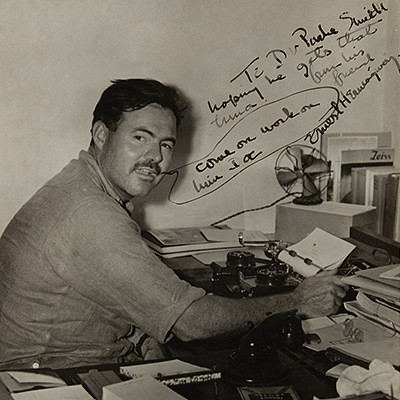Albert Einstein Autograph Letter Signed to Son on Psychiatric Care, the USA, and Literature
Two ways to bid:
- Leave a max absentee bid and the platform will bid on your behalf up to your maximum bid during the live auction.
- Bid live during the auction and your bids will be submitted real-time to the auctioneer.
Bid Increments
| Price | Bid Increment |
|---|---|
| $0 | $5 |
| $50 | $10 |
| $200 | $25 |
| $500 | $50 |
About Auction
Sep 13, 2023
RR Auction support@rrauction.com
- Lot Description
ALS in German, signed “Your Papa,” one page both sides, 7.5 x 11.5, October 8, 1932. A lengthy and touching handwritten letter of encouragement to his youngest son Eduard Einstein, nicknamed "Tetel," who had been diagnosed with schizophrenia two years earlier and recently interned at the Burghölzli psychiatric hospital in Zurich. Einstein tells Tetel not to worry about having had to be interned for treatment. A friend he knew in Pasadena was in such a state of painful depression at the start of the war that he had to go to a neurological hospital. When he finally recovered, after staying there for a year, and they wanted to release him, he stayed there anyway, declaring that there was no better refuge for a knowledge worker and to this day he is in good spirits and in excellent health. And first of all, Tetel should no longer worry about the matter of the will: his father will not talk about it anymore, let him be reassured and trust him. It would be wonderful if he came to visit him before December, the time of Einstein's trip to California. He himself cannot leave Caputh, because he needs his collaborator for important works. He hopes to take his son to America next year; this year it would have been too expensive, and also too difficult, since Einstein has exhausting responsibilities in California. But next year, he will spend five months in Princeton, near New York, a quiet and hospitable place, perfect for him. At the moment he is spending his days working and sailing. His son too should strive to make his life as simple and peaceful as possible. Has he read the fairy tales of Hans Christian Andersen? He has read them so long ago that he intends to reread them. Recently he read the second part of Faust, without being as impressed with it as most people. He begs Tetel to write soon, and in detail, about his concerns. Ilse was in Carlsbad after several years of psychoanalysis which helped her a lot. One day, when Tetel visits him, he will have to teach his father psychoanalysis: Einstein promises to be careful, and above all to remain serious. But the most important thing is to pull himself together, to finally be able to come and see him. In fine condition, with expertly repaired splits to folds.
Einstein penned the letter from his summer house in Caputh, just south of Potsdam; it provides a window into a more compassionate side of the renowned physicist. As mentioned in the letter, Einstein left for the USA two months later, not knowing that the rise of the Nazis would prevent him from ever returning to his country of birth. Tragically, in spite of the hopes expressed in this letter, he would never see Tetel again. Tetel was an admirer of Sigmund Freud, even hanging a picture of the neurologist on his bedroom wall; he had once hoped to enter the fledgling field of psychiatry, but was diagnosed with schizophrenia in 1930 at age twenty, rendering him a patient rather than a practitioner. This explains Einstein’s comment that "one day‰Û_he will have to teach his father psychoanalysis." Tetel’s mother, Mileva Marić (Einstein’s first wife) cared for him until she died in 1948; after which he mainly lived at the psychiatric clinic in Burghölzli, where he died in 1965 of a stroke at age 55. - Shipping Info
-
Bidder is liable for shipping and handling and providing accurate information as to shipping or delivery locations and arranging for such. RR Auction is unable to combine purchases from other auctions or affiliates into one package for shipping purposes. Lots won will be shipped in a commercially reasonable time after payment in good funds for the merchandise and the shipping fees are received or credit extended, except when third-party shipment occurs. Bidder agrees that service and handling charges related to shipping items which are not pre-paid may be charged to a credit card on file with RR Auction. Successful international Bidders shall provide written shipping instructions, including specified Customs declarations, to RR Auction for any lots to be delivered outside of the United States. NOTE: Declaration value shall be the item’(s) hammer price and RR Auction shall use the correct harmonized code for the lot. Domestic Bidders on lots designated for third-party shipment must designate the common carrier, accept risk of loss, and prepay shipping costs.
-
- Buyer's Premium



 EUR
EUR CAD
CAD AUD
AUD GBP
GBP MXN
MXN HKD
HKD CNY
CNY MYR
MYR SEK
SEK SGD
SGD CHF
CHF THB
THB













